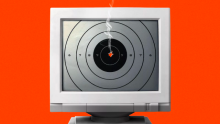
Baltimore is piloting a software program developed by Everytown for Gun Safety that will enable it for the first time to identify patterns of gun trafficking and illegal sales.
Why it matters: If successful, this crime-fighting software — which draws data from multiple systems and connects the dots — could be used to crack down in many cities where gun violence is a big problem.
Driving the news: Everytown, the gun control advocacy group, worked in-house and with an outside software developer to create the tool — described first to Axios — and partnered with Baltimore to tailor it to the city's needs.
- The system — dubbed "Gun Trafficking Intelligence Platform" — looks at weapons involved in crimes and works to identify patterns.
- It can pinpoint gun shows and individual dealers who serve as major suppliers, plus the names of repeat "straw purchasers," who buy firearms on behalf of prohibited buyers.
- "By aggregating data, you are not solving one crime at a time, but you’re actually seeing patterns that allow you to unlock trafficking enterprises," John Feinblatt, president of Everytown for Gun Safety, tells Axios.
- "Cities have been operating largely in the dark, and this tool is really a flashlight."
Where it stands: Baltimore has suffered from high rates of gun violence for years. While it has strong gun control laws — as does Maryland — it sits on the I-95 corridor, where guns flow in from states with weaker laws.
- Of the 2,543 weapons seized in Baltimore in 2020, 63% came from outside the state, and 82% from outside the city, Mayor Brandon M. Scott tells Axios.
- "We are a city that’s been dealing with this epidemic of gun violence as long as I’ve been alive," Scott says.
Between the lines: Feinblatt of Everytown says weak federal laws thwart the ability of law enforcement to see the type of patterns illuminated by the software tool.
- "We have federal laws that have been put into place largely through the advocacy of the N.R.A. that suppress this type of information," he says.
- "It makes it difficult to actually see who are the worst gun dealers in the country" as well as " those gun dealers that consistently pop up" as the source of weapons involved in crimes.
The bottom line: Gun violence takes a disproportionate toll on cities and communities of color, and this tool could potentially help make people safer.
- "Baltimore is a great test case, and, if successful there, I think that we will move it to other cities," Feinblatt says.
by Jennifer A. Kingson
